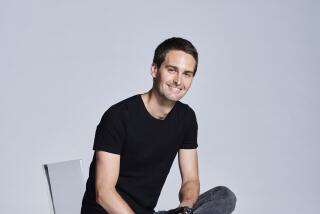Ouster of Bertelsmann’s CEO Bodes Ill for Napster
- Share via
SAN FRANCISCO — The odds of dormant song-swapping service Napster reemerging as an authorized distributor of music diminished substantially with the departure of Bertelsmann Chief Executive Thomas Middelhoff, though no decisions have been made, people at both companies said Tuesday.
Middelhoff led two investments in the Redwood City-based Internet firm for a combined $85 million and agreed to buy Napster’s assets for $8 million more through a bankruptcy auction scheduled for late August. That sale has yet to be completed, and Napster is more vulnerable than other divisions of Bertelsmann because it hasn’t been integrated, the people said.
No other Bertelsmann executives had the same level of enthusiasm for the project as Middelhoff, who once declared that a legitimized Napster could be as big as America Online.
Napster pioneered efficient peer-to-peer sharing of recordings stored on tens of millions of personal computers. Most of the recordings were pirated, and Napster was losing a copyright lawsuit brought by the major record labels when a federal judge ordered it to stay shut.
Napster then developed an unreleased system including provisions for protecting music rights. It still lacks the major-label content that Bertelsmann could provide. Earlier, Bertelsmann’s directors had expressed concern about the expense of a proposed settlement with the labels, later abandoned as Middelhoff began negotiating to bring Napster into the Bertelsmann fold.
Napster’s remaining skeleton crew, which includes founder Shawn Fanning, has yet to hear anything about Bertelsmann’s intentions, employees said.
“They are having lots of meetings,” one said. “We have no indication of anything.”
Bertelsmann is contractually obligated to make its bid for Napster but not to operate it. Napster allies are trying to find other potential bidders by the Aug. 21 deadline in case the media company backs away from Middelhoff’s plan.
The employees took some comfort in reports that Middelhoff’s emphasis on the Internet didn’t provoke his ouster. Instead, he battled with the German publishing giant’s controlling family over how much of the firm they should maintain in a planned initial public offering.
In his first public comments since his dismissal Sunday, Middelhoff told German television that the company could keep its “strong cultural ties” to its base in Gutersloh and remain three-quarters controlled by the family. An existing plan to let a minority shareholder sell as much as 25% of Bertelsmann’s shares in 2005--which would make it Europe’s largest listed media company--would not dilute the family’s control.
But Middelhoff said he had a more ambitious vision, implying a greater public stake.
“Even if today the stock market climate is bad, the management must have the flexibility to develop this company further with a stock listing in the medium and long term,” Middelhoff said. “Otherwise, a big firm like Bertelsmann can hardly stay competitive internationally in the size class where it currently finds itself.”
Bertelsmann officials declined to comment. A member of the controlling Mohn family told a newspaper that new CEO Gunter Thielen, who is known as a cost cutter, shouldn’t be written off as an “old-economy” executive just because he comes from the company’s printing division, Arvato.
“Thielen is being underestimated,” Christoph Mohn, who heads Internet portal Lycos Europe, told the Tagesspiegel daily. “He has built a highly modern and very profitable service branch from the traditional printing business.”
Arvato reflects the company’s origins as a printer of religious books, but Bertelsmann also owns e-commerce firm Pixelpark. Other holdings include No. 1 book publisher Random House, music firm BMG Entertainment and European television and magazines.
Thielen has begun a review of Bertelsmann’s assets and will meet with the company’s board Wednesday.
Middelhoff said he would take a long vacation in France to consider whether his career would continue outside Germany, “possibly on another continent.”
Times staff writer Jon Healey contributed to this report and Associated Press was used in compiling it.
More to Read
The biggest entertainment stories
Get our big stories about Hollywood, film, television, music, arts, culture and more right in your inbox as soon as they publish.
You may occasionally receive promotional content from the Los Angeles Times.










